#Economic Book
Text
"Lifetime Investor" by Yoshiaki Murakami
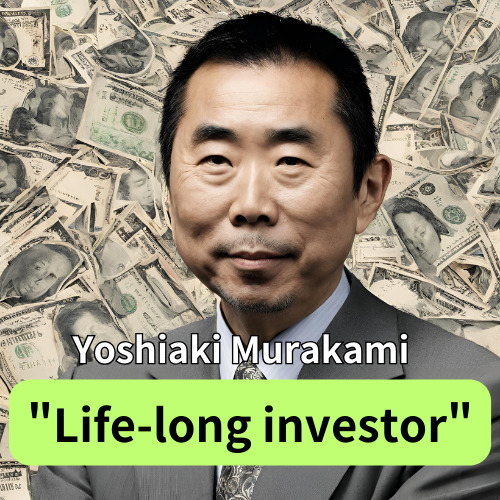
Yoshiaki Murakami wrote a book titled "Lifelong Investor" that describes his experience and investing philosophies.
It is well known that Murakami was previously detained and found guilty of insider trading in stock of the Nippon Broadcasting System. But underlying all of this was his profound understanding of Japanese company management and his firm confidence in investing.
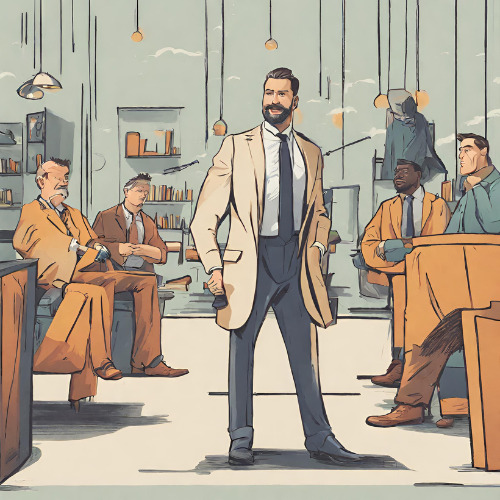
The book describes Murakami's motivation for entering the investment sector, his past endeavors, and his perspective on Japanese businesses—particularly those that are publicly traded. It also discusses his leadership of the Murakami Fund, his investing style, and his goals for the advancement of Japan's economy.

Anyone interested in investing will find this book to be very helpful, especially if they want to learn more about company governance and corporate management. However, it is advised that you actually read this book in order to get the details.
#Investment#Economy#Corporate Governance#Investment Philosophy#Japanese Company#Management#Investment Style#Economic Growth#Investment Goal#Insider Trading#Investor#Business Book#Economic Book#Book Lover#Investment Introduction
1 note
·
View note
Text
Yanis Varoufakis’s “Technofeudalism: What Killed Capitalism?”
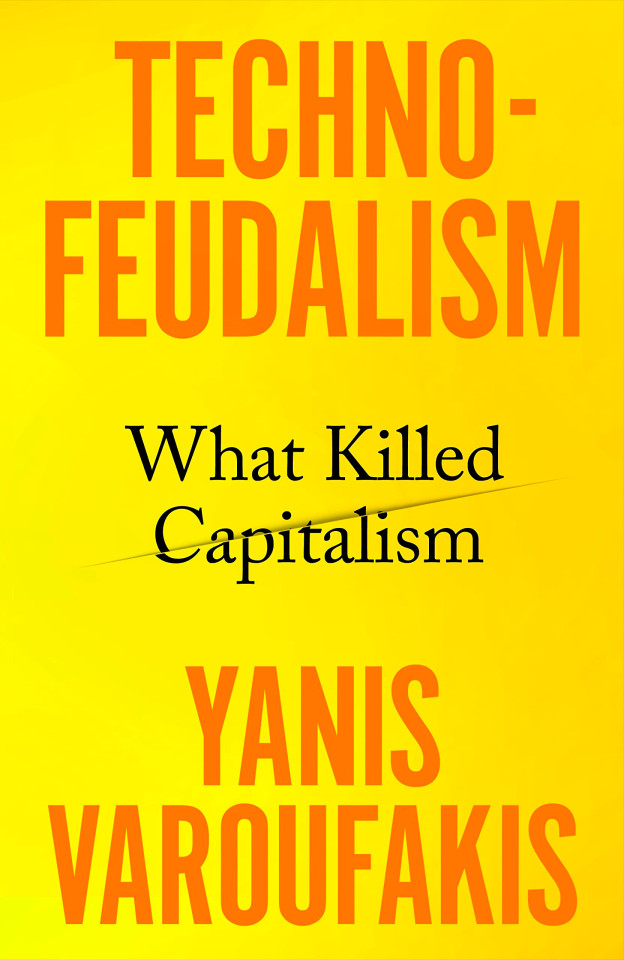
Monday (October 2), I'll be in Boise to host an event with VE Schwab. On October 7–8, I'm in Milan to keynote Wired Nextfest.

Socialists have been hotly anticipating the end of capitalism since at least 1848, when Marx and Engels published The Communist Manifesto - but the Manifesto also reminds us that capitalism is only too happy to reinvent itself during its crises, coming back in new forms, over and over again:
https://www.nytimes.com/2022/10/31/books/review/a-spectre-haunting-china-mieville.html
Now, in Technofeudalism: What Killed Capitalism, Yanis Varoufakis - the "libertarian Marxist" former finance minister of Greece - makes an excellent case that capitalism died a decade ago, turning into a new form of feudalism: technofeudalism:
https://www.penguin.co.uk/books/451795/technofeudalism-by-varoufakis-yanis/9781847927279
To understand where Varoufakis is coming from, you need to go beyond the colloquial meanings of "capitalism" and "feudalism." Capitalism isn't just "a system where we buy and sell things." It's a system where capital rules the roost: the richest, most powerful people are those who coerce workers into using their capital (factories, tools, vehicles, etc) to create income in the form of profits.
By contrast, a feudal society is one organized around people who own things, charging others to use them to produce goods and services. In a feudal society, the most important form of income isn't profit, it's rent. To quote Varoufakis: "rent flows from privileged access to things in fixed supply" (land, fossil fuels, etc). Profit comes from "entrepreneurial people who have invested in things that wouldn't have otherwise existed."
This distinction is subtle, but important: "Profit is vulnerable to market competition, rent is not." If you have a coffee shop, then every other coffee shop that opens on your block is a competitive threat that could erode your margins. But if you own the building the coffee shop owner rents, then every other coffee shop that opens on the block raises the property values and the amount of rent you can charge.
The capitalist revolution - extolled and condemned in the Manifesto - was led by people who valorized profits as the heroic returns for making something new in this world, and who condemned rents as a parasitic drain on the true producers whose entrepreneurial spirits would enrich us all. The "free markets" extolled by Adam Smith weren't free from regulation - they were free from rents:
https://locusmag.com/2021/03/cory-doctorow-free-markets/
But rents, Varoufakis writes, "survived only parasitically on, and in the shadows of, profit." That is, rentiers (people whose wealth comes from rents) were a small rump of the economy, slightly suspect and on the periphery of any consideration of how to organize our society. But all that changed in 2008, when the world's central banks addressed the Great Financial Crisis by bailing out not just the banks, but the bankers, funneling trillions to the people whose reckless behavior brought the world to the brink of economic ruin.
Suddenly, these wealthy people, and their banks, experienced enormous wealth-gains without profits. Their businesses lost billions in profits (the cost of offering the business's products and services vastly exceeded the money people spent on those products and services). But the business still had billions more at the end of the year than they'd had at the start: billions in public money, funneled to them by central banks.
This kicked off the "everything rally" in which every kind of asset - real estate, art, stocks, bonds, even monkey JPEGs - ballooned in value. That's exactly what you'd expect from an economy where rents dominate over profits. Feudal rentiers don't need to invest to keep making money - remember, their wealth comes from owning things that other people invest in to make money.
Rents are not vulnerable to competition, so rentiers don't need to plow their rents into new technology to keep the money coming in. The capitalist that leases the oil field needs to invest in new pumps and refining to stay competitive with other oil companies. But the rentier of the oil field doesn't have to do anything: either the capitalist tenant will invest in more capital and make the field more valuable, or they will lose out to another capitalist who'll replace them. Either way, the rentier gets more rent.
So when capitalists get richer, they spend some of that money on new capital, but when rentiers get richer, them spend money on more assets they can rent to capitalists. The "everything rally" made all kinds of capital more valuable, and companies that were transitioning to a feudal footing turned around and handed that money to their investors in stock buybacks and dividends, rather than spending the money on R&D, or new plants, or new technology.
The tech companies, though, were the exception. They invested in "cloud capital" - the servers, lines, and services that everyone else would have to pay rent on in order to practice capitalism.
Think of Amazon: Varoufakis likens shopping on Amazon to visiting a bustling city center filled with shops run by independent capitalists. However, all of those capitalists are subservient to a feudal lord: Jeff Bezos, who takes 51 cents out of every dollar they bring in, and furthermore gets to decide which products they can sell and how those products must be displayed:
https://pluralistic.net/2022/11/28/enshittification/#relentless-payola
The postcapitalist, technofeudal world isn't a world without capitalism, then. It's a world where capitalists are subservient to feudalists ("cloudalists" in Varoufakis's thesis), as are the rest of us the cloud peons, from the social media users and performers who fill the technofuedalists' siloes with "content" to the regular users whose media diet is dictated by the cloudalists' recommendation systems:
https://pluralistic.net/2023/01/21/potemkin-ai/#hey-guys
A defining feature of cloudalism is the ability of the rentier lord to destroy any capitalist vassal's business with the click of a mouse. If Google kicks your business out of the search index, or if Facebook blocks your publication, or if Twitter shadowbans mentions of your product, or if Apple pulls your app from the store, you're toast.
Capitalists "still have the power to command labor from the majority who are reliant on wages," but they are still mere vassals to the cloudalists. Even the most energetic capitalist can't escape paying rent, thanks in large part to "IP," which I claim is best understood as "laws that let a company reach beyond its walls to dictate the conduct of competitors, critics and customers":
https://locusmag.com/2020/09/cory-doctorow-ip/
Varoufakis points to ways that the cloudalists can cement their gains: for example, "green" energy doesn't rely on land-leases (like fossil fuels), but it does rely on networked grids and data-protocols that can be loaded up with IP, either or both of which can be turned into chokepoints for feudal rent-extraction. To make things worse, Varoufakis argues that cloudalists won't be able to muster the degree of coordination and patience needed to actually resolve the climate emergency - they'll not only extract rent from every source of renewables, but they'll also silo them in ways that make them incapable of doing the things we need them to do.
Energy is just one of the technofeudal implications that Varoufakis explores in this book: there are also lengthy and fascinating sections on geopolitics, monetary policy, and the New Cold War. Technofeudalism - and the struggle to produce a dominant fiefdom - is a very useful lens for understanding US/Chinese tech wars.
Though Varoufakis is laying out a technical and even esoteric argument here, he takes great pains to make it accessible. The book is structured as a long open letter to his father, a chemical engineer and leftist who was a political prisoner during the fascist takeover of Greece. The framing device works very well, especially if you've read Talking To My Daughter About the Economy, Varoufakis's 2018 radical economics primer in the form of a letter to his young daughter:
https://us.macmillan.com/books/9780374538491/talkingtomydaughterabouttheeconomy
At the very end of the book, Varoufakis calls for "a cloud rebellion to overthrow technofeudalism." This section is very short - and short on details. That's not a knock against the book: there are plenty of very good books that consist primarily or entirely of analysis of the problems with a system, without having to lay out a detailed program for solving those problems.
But for what it's worth, I think there is a way to plan and execute a "cloud rebellion" - a way to use laws, technology, reverse-engineering and human rights frameworks to shatter the platforms and seize the means of computation. I lay out that program in The Internet Con: How the Seize the Means of Computation, a book I published with Verso Books a couple weeks ago:
https://www.versobooks.com/products/3035-the-internet-con

If you'd like an essay-formatted version of this post to read or share, here's a link to it on pluralistic.net, my surveillance-free, ad-free, tracker-free blog:
https://pluralistic.net/2023/09/28/cloudalists/#cloud-capital
#pluralistic#yanis varoufakis#socialism#communism#technofeudalism#economics#postcapitalism#political science#rent-seeking#rentiers#books#reviews#gift guide
733 notes
·
View notes
Text

whiskey & writing this thesis bc the introduction chapter is taking more linguistical creativity than what I have with just caffeine (idk what to write in this without it sounding like a 3rd grader’s essay yikes)
#also I ran out of whiskey :( been saving this last glass for ages bc whiskey expensive#but the cravings got the best of me (if i was being economical I would’ve had the cheap vodka I have in my fridge but it’s so bad I cant)#and I just mmmight be financially irresponsible and go buy a new one tonight#tho no clue which one#my budget is not high#but I am not fucking buying jameson#bookblr#studyblr#booklr#aesthetic#books#study#reading#read#book#tw alcohol#alcohol tw#dark academia#february 2024#2024
332 notes
·
View notes
Text


Surprised he isn’t running for the gop nomination for POTUS.
#capitalism#democrats#republicans#politics#covid#wga strike#books#socialism#jobs#ai#economics#economy
600 notes
·
View notes
Text

Bumblebees of North and Central America
Detail of a diagram of Bumblebees of North and Central America in the book Bumblebee Economics by Bernd Heinrich. Cambridge, MA: Harvard University Press, 1979. QL 568 .A6 H39
382 notes
·
View notes
Text
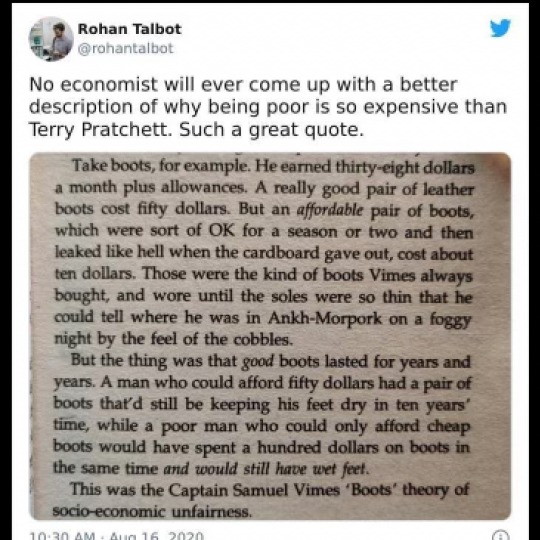
From the 1993 Discworld series novel Men at Arms by Terry Pratchett.
#Terry Pratchett#boots theory of economic unfairness#Discworld#book excerpt#Men at Arms#economics#poverty#twitterature#Rohan Talbot
166 notes
·
View notes
Text
I was not expecting a Discworld reference in the book I'm reading about the invention of the index fund.
Describing conflicting management styles of mutual fund managers going through a merger, the author explains one is egalitarian. The other "had a more Ankh Morpork style philosophy of one man, one vote. He was the man, so he had the vote."
#gnu terry pratchett#discworld#seriously this book has mostly been about economic academics in the 50s and 60s#and it's about the american stock market#so not exactly a british perspective#the book is called Trillions btw#if they get into boots theory i'm going to lose it
117 notes
·
View notes
Text
THE DEATH OF CAPITALISM.
THE BIRTH OF???
Technofeudalism
- Yanis Varoufakis
An interesting idea for Socialists/Communists to think about as traditional Left/Right distinctions seem to be becoming more irrelevant and meaningless than ever before.
Part of this may be due to what Yanis Varoufakis is calling the "death of Capitalism" and the birth of "Technofeudalism."
Varoufakis, in his new book of the same name, argues that the rise today's tech giants came at a time of a complete lack of regulation and coupled with a corporate culture of greed and complete disregard for human life, encouraged and financed by cheap government capital flowing into a deregulated banking sector that funneled the money straight into the pockets of the same investors of Big Tech, Big Media, Big Pharma and the like. Essentially, these fiefdoms are warping the very modes of production and changing the power dynamics of the previous global capitalist world order.
Combined with a political system sold to the highest bidder, this has resulted in modern tech fiefdoms popping up throughout the world and global economy that are more powerful than the governments they control, that in theory at least, are supposed to control them.
So... we're slipping back into feudalism, and now a famous self-proclaimed Marxist Economist and academic leader has wrote an entire book dedicated to something I've been saying for two years now. And I'm an ordinary worker and two-time college drop out.
Strange world we live in 🤔
#yanis varoufakis#technofeudalism#books#socialist books#socialism#communism#marxism leninism#socialist politics#socialist#communist#marxism#marxist leninist#politics#economics#feudalism#modern feudalism#workersolidarity#socialist worker#worker solidarity#WorkerSolidarityNews#news#economy#global capitalism#globalism#globalists#world economic forum#techno dystopia#dystopia#us imperialism#imperialism
168 notes
·
View notes
Text
Last week on #CoffeeWithACodex, we took a look at Ms. Codex 19, a 14th century list of rents due to one Ithier Bonea, seignor des Brousses, an area of France over which he was a landowner. Most of the listings of tenants are by parish, occasionally by town. In this compilation, Curator Dot Porter points out some of the notable aspects of the manuscript. Follow the link to watch the whole 30 minute video.
🔗:
#medieval#manuscript#medieval manuscript#14th century#economics#landlords#history of economics#rents#parchment#book history#rare books#french#france
57 notes
·
View notes
Text
Hey, yanno how Climate Change is a real thing that is tangibly, at this moment, affecting our world?
Well it turns out, the wealthy and their investment firms have been seeing the mounting evidence that oil companies have had for decades and are slowly starting to think more long-term about their portfolios in the face of rising sea levels, more extreme weather, and the myriad of ways climate crises are affecting...well. Everything. Maybe this means they invest more into sustainability, green energy, building more resilient infrastructure, or carbon offsets. Some of it, of course, is simple corporate greenwashing, but there are those that are taking this trend and packaging it into something called ESG (Environmental, Social, and corporate Governance).
Now some people would say this is predictable, even sensible. Just the good ol’ Free Market(tm) rationally responding to market forces and a changing world.
But those people would be fools! Insidious fools! For conservative sorcerers have come out with a new cursed phrase to explain this new market trend: Woke Investing.
What makes this investing “woke?” Well, much like how conservatives normally flounder when trying to define a word they stole from black people, “Woke Investing” essentially just means any kind of capital investment that they, the fossil fuel billionaire class and their sycophants, don’t personally profit from.
One of these aforementioned sycophants is Andy Puzder, conservative commentator, fellow at The Heritage Foundation, and former fast-food CEO. He calls this kind of so-called woke investing “socialism in sheep’s clothing,” further explaining in leaked audio of a closed-door meeting:
“My father's generation's challenge was the Nazis, who, by the way, were, of course, very proud socialists[citation fucking needed]. The challenge of my generation was the communists, who were, of course, very committed socialists. The challenge of your generation is ESG investing, and it's more insidious than communism or the Nazis.”(source)
You heard it here first, folks. Not investing as much in fossil fuels is more insidious than the Third Fucking Reich.
As usual, the Heritage Foundation is putting their petro-chemical donor’s money where their mouth is. Bills are being proposed to blacklist banks that don’t invest in key state industries, such as West Virginia coal or Texas oil. Fourteen states have already passed bills to restrict ESG-type investing, with Florida Governor Ron “Bullies Kids for Wearing Masks” Desantis leading the charge.
In other words, Climate Denial has reached such a point that so-called Free Market Conservatives who claim to hate big government are trying to make it illegal for banks, investment firms, and financial institutions to make any financial decisions that acknowledges Climate Change is real.
#of course ESG has also been used to describe any kind of internal corporate action#to increase diversity in the work place or implementing new anti-discrimination policies#(which are usually more performative than actually meaningful but that's a separate issue)#a Republican Presidential candidate#Vivek Ramaswamy#has even made ESG investing his personal bugbear#writing such books as 'Woke Inc' and warning of socially conscious investors ''forcing'' companies they invest in#to devote resources to environmental and social policies that are anathema to the right#which is just...a brand new invented crisis by a political movement#in constant need of a crisis to rally their base and justify for draconian legal controls#to favor certain industries and undercut their competition#all under the guise of red scare-type moral and economic panic#ESG#Woke Politics#Climate Change#Capitalism#Republicans#Investment
112 notes
·
View notes
Text
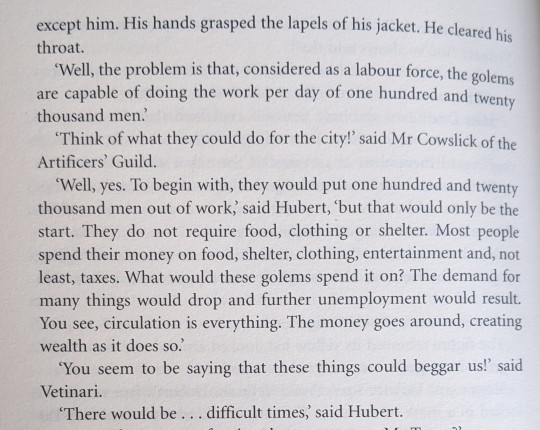
Reread Making Money and god this bit about the golems feels SO relevant with recent discussions about AI in the workforce, Terry did not miss
#terry pratchett#discworld#making Money#great book though#hadn't read it since i was very young and its economic discussions have aged really well#personal post
166 notes
·
View notes
Video
list of books
https://www.versobooks.com/books/3665-how-to-blow-up-a-pipeline
https://davidgraeber.org/books/bullshit-jobs/
https://www.penguinrandomhouse.com/books/215462/dark-money-by-jane-mayer/
https://www.hup.harvard.edu/catalog.php?isbn=9780674238091
https://www.emilyhund.com/
https://www.emilylynnpaulson.com/books
https://emilycontois.com/dinersdudesdiets/
https://www.hup.harvard.edu/catalog.php?content=reviews&isbn=9780674241213
https://brownstargirl.org/the-future-is-disabled/
https://beltpublishing.com/products/radical-suburbs
https://press.uchicago.edu/ucp/books/book/distributed/H/bo28433484.html
https://www.juliberwald.com/life-on-the-rocks/
https://beltpublishing.com/products/rethinking-fandom-how-to-beat-the-sports-industrial-complex-at-its-own-game
https://firestorm.coop/products/18989-laziness-does-not-exist.html
https://www.harvard.com/book/cultish/
https://americanexception.com/book/
#tiktok#books and literature#books and writing#books and libraries#books and reading#books and authors#books#read this#reading#capitalism is a scam#Healthcare#profit#economy#economics#technology#technology history#tech bros#tech#climate crisis
327 notes
·
View notes
Text
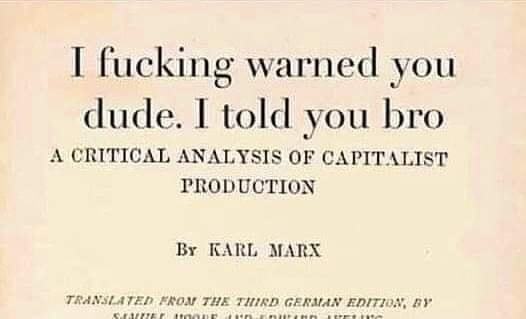
67 notes
·
View notes
Text
"...[W]e must continue to challenge the societal arrangements that leads to preventable pain and suffering. Marriage can be quite beautiful and sacred, for example. Marriage can also privatize dependence: it encourages people to enter relationships for resources and benefits, like health care, savings, and tax deductions. I was nineteen years old when I got married, mostly informed by my faith tradition. I was also in love, but very poor, and marriage offered me a stability that I never had as a child. I was so lucky that the person I married was kind, thoughtful, and also very much trying to figure out his relationship to Christianity and his evolving manhood.
When we divorced nine years later and became friends and co-parents, I realized how the marital benefits I once aspire dot have did not make sense. I could remove him from my health insurance to account for the divorce, but I couldn't add any of my uninsured siblings, whom I would be related to forever. And our children had two options for insurance because they had parents who went to college and worked jobs that offered it, but independent contractors in my family did not have an option that wasn't a financial sacrifice.
If we focused on meeting the healthcare, employment, educational, and housing needs of people in society, then those who want to marry could more freely enter those relationships in their terms, and people who needed to escape because of violence could more easily leave without worrying what will happen if they get sick and need to see a doctor.
We should heed to calls for investment in the programs, opportunities, and laws that make everyone free and safe. Here too, universal basic income can help, allowing people to meet their basic needs and not rely on potentially sexually exploitative intimate relationships for income. Removing benefits from marriage accomplishes this, too. With universal health care, and other programs like free and quality childhood education, people vulnerable to violence have more free range to move, live, and practice healthy lifestyles."
-- Becoming Abolitionists: Police, Protests, and the Pursuit of Freedom by Derecka Purnell
#angel posts#angel reads#becoming abolitionists#derecka purnell#the more i read this book the better it gets tbh#every page she's talking about a new activist or abolitionist she's met#she's BUSY#and im googling the orgs here bc i wanna get more active too#but this passage made me think of the tradwife thing#people fail to realize that tying economic stability to marriage is so dangerous
95 notes
·
View notes
Text
I think one of my biggest critiques about Catching Fire as a movie is that there’s entirely too much Gale in it. And I’m not just saying this as a Peeta Girlie, I’m saying this because Gale’s palpable absence is so strong at the beginning of the book that it’s a presence within and of itself and that’s central to the first part of the story!! The fact that Peeta is there when Gale isn’t is key to showing How The Games Have Effected Katniss!!
Katniss is experiencing this meteoric rise in economic class practically overnight. She’s gained an immense amount of privilege, relatively speaking, at an immense cost (the trauma of the Games, the damage to her emotional and mental well-being, the damage to her sense of self, the increased risk that immediate harm might come to her family and loved ones). She’s realizing that she really was part of her community before the Games by virtue of being distanced from that same community now. Because that’s what the Games, and the resulting class hyper-mobility, did to her: it’s set her apart from her peers. And Gale being absent is part of that. She doesn’t have to go to school. She doesn’t have to hunt or trade at the Hob. She doesn’t have to join the district’s industry. But Gale does have to do all those things. It’s why they only ever see each other on Sundays, the one day of the week he isn’t in the minds. It’s why they have increasingly little to talk about when they do meet, because their lives are so vastly different now and because the things that do occupy Katniss’s days are things generally related to her stratospheric class leap and/or the horrific cost of that leap, things she either doesn’t want to talk about or straight up can’t talk about.
She’s had this seismic shift in her life that’s detached her from her world and turned her into an island. Peeta and Haymitch (and to a lesser degree her mom and Prim) are the only ones that have been metaphorically cast out to sea like her. That’s why they’re a constant presence in the beginning of the book when Gale is not. And that’s why adding in scenes with Gale to the beginning of the movie (or keeping in scenes with Gale at the cost of like. literally every other thing that happens in that part of the book, including all the time she spends with Peeta and the others) undermines that point.
#thg#catching fire#Katniss Everdeen#the hunger games#hunger games meta#I mean there’s obviously other reasons I think Peeta’s presence is important athe beginning of the book#not just bc it shows how the games have effected Katniss bc of how her economic class has changed#but bc it shows how the games have effected her by bonding her to him in a way no one else could ever be#and it shows his steadfast loyalty etc etc#but also yeah having soooo much gale doesnt just undermine Peeta’s character development and the development of their relationship#it also undermines showing how Katniss’s life has changed as a result of the games
99 notes
·
View notes
Text
“We have seen how the colonized always dream of taking the colonist’s place. Not of becoming a colonist, but of replacing him. This hostile, oppressive and aggressive world, bulldozing the colonized masses, represent not only the hell they would like to escape as quickly as possible, but a paradise within arms reach guarded by ferocious watchdogs.” Frantz Fanon, the Wretched of the Earth (16)
#quotes#I dare say a book has never hit as closed to home the alienation I feel as a worker#yes he is speaking about the violence of imperialism but as someone whose#mother came to this country due to economic hardship in latin America it speaks to me
50 notes
·
View notes